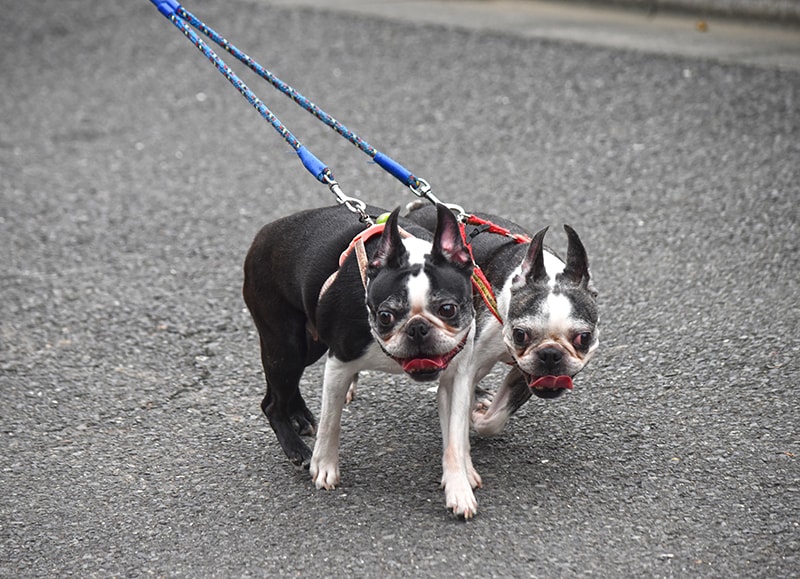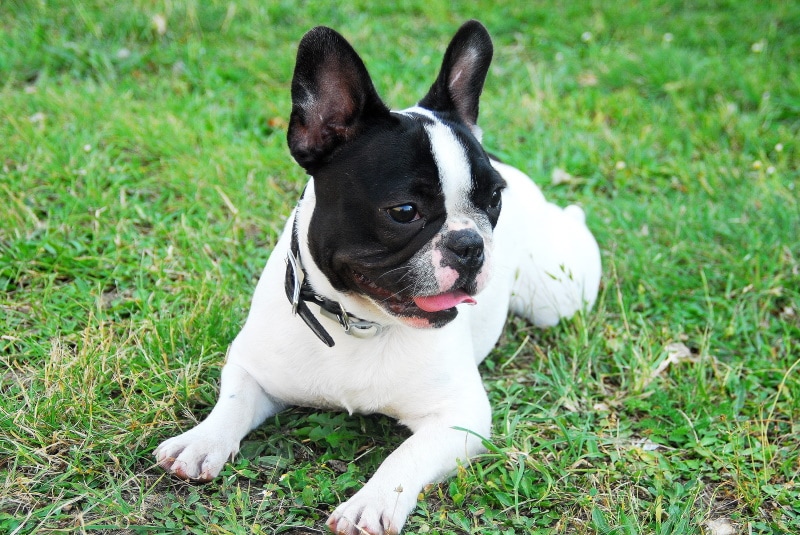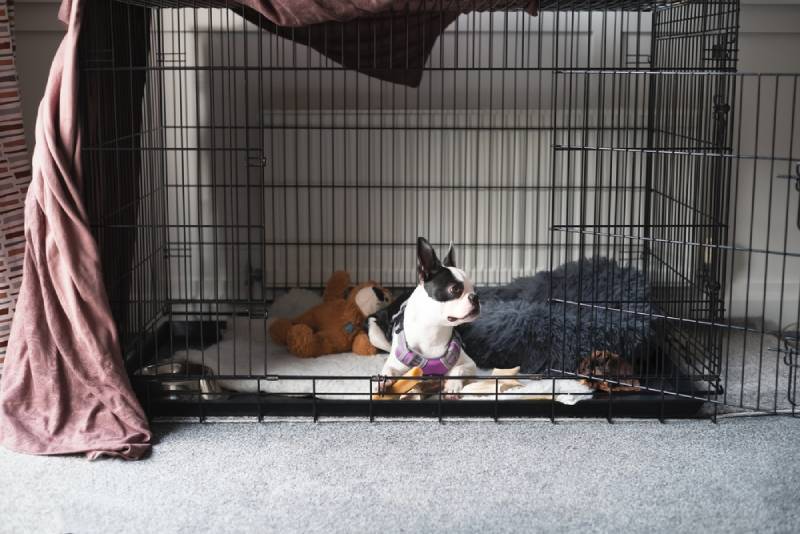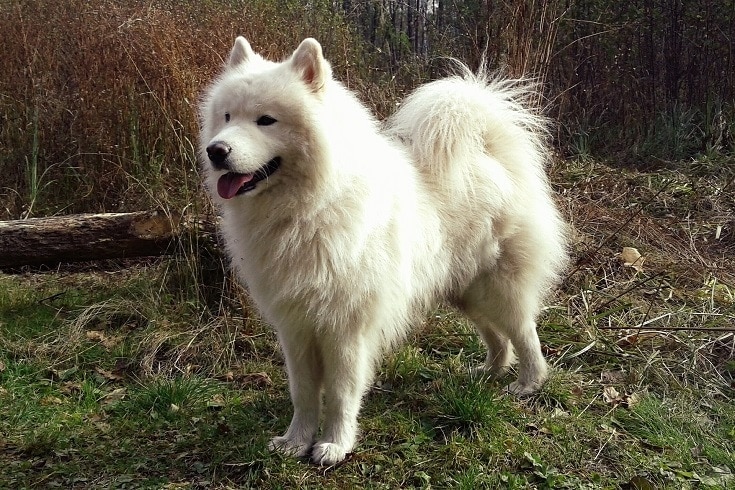When Do Boston Terriers Calm Down? Breed Facts & FAQ
Updated on

Boston Terriers are a breed filled with joy and a zest for life that is easy to envy. These dogs can be incredibly entertaining with their antics and in the beginning, it seems that their energy and playfulness remain at full steam until they suddenly stop for a nap.
So, when exactly do Boston Terriers stop bouncing off the walls and reach a state of calm? Well, the answer is highly dependent on the individual dog in question but generally, the breed begins to slow down sometime between 12 and 18 months of age.
Life Stages of the Boston Terrier – and What to Expect
The average lifespan of a Boston Terrier is between 11 and 13 years of age. Just like with humans, you will notice different energy levels throughout their lifetime. Here’s an idea of what you can expect throughout your Boston Terriers’ different life stages but remember that each dog is unique in their energy levels and behaviors.1
Puppyhood

The puppy stage lasts from birth until about 6 months of age. Boston Terrier puppies won’t be ready to leave their mother and go to a new home until at least 8 weeks of age. Like most puppies, they will be full of energy and on the go. After all, they have a brand-new world to learn and explore.
Your Boston Terrier will be very lively during puppyhood and their playfulness will be at its height. They will also spend a lot of time sleeping, which is essential for their growth and development. Training should begin immediately upon bringing your puppy home to ensure it develops into a well-behaved and well-rounded member of the family.
Adolescence

Most Boston Terriers will still have boundless energy well into adolescence, which lasts from about 6 to 18 months of age. During this stage, most pups will be well on their way to being fully potty trained and will have picked up on many commands, provided they have received consistent training.
Don’t be alarmed if your Boston Terrier is bouncing off the walls and gets the zoomies regularly. Engage them in play and go for regular walks to get that daily dose of exercise and energy expenditure in. It will help tire them out and leave the house a bit quieter at the end of the day.
Most dogs are expected to be quite hyper and energetic during this stage and may even start to test their boundaries and rebel a bit. If they do start to act out and become disobedient, remember to be patient, and keep up with your regular training schedule.
Adulthood

A Boston Terrier will reach full maturity and be considered an adult around 18 months of age. At this stage of their life, they will stop growing and will have reached adult size, which is typically between 15 and 17 inches tall and between 12 and 25 pounds.
Just like with humans, full maturity means that high energy will begin to level out and their true personality will start to show. Even as adults, Boston Terriers will remain friendly, outgoing, and playful as these traits are part of the breed’s nature.
While they’ll still be active, you will notice they will have calmed down when compared to puppyhood and early adolescence. Don’t worry though, that goofiness and spirited attitude we all know and love will remain strong.
Senior

You will notice a decrease in your Boston Terrier’s energy as time passes. This is typical of the aging process for all living beings. The breed will be considered a senior when they reach 7 to 8 years of age. During this life stage, you will notice the most drastic decrease in energy levels as your dog begins to slow down.
Be sure to keep up with regular veterinary exams to ensure your Boston Terrier remains as healthy as possible during their senior years. Old age can lead to both physical and cognitive decline, so it’s best to keep up with medical care, proper nutrition, and physical and mental stimulation.
The average lifespan of the breed is typically between 11 and 13 years of age, so even when they enter their senior years you may still have plenty of time left with your precious companion. It is important to keep them regularly active but be aware of their limits and remain watchful of their overall health.
What Else Would Cause My Boston Terrier to Have So Much Energy?
While a young age is most commonly associated with high energy levels, there are a couple of other reasons why your full-grown Boston Terrier is hyperactive and filled with seemingly limitless energy, take a look.
Lack of Exercise

The Boston Terrier is one of the very few breeds that originated in the United States. They are descended from Bulldog-type breeds and terriers which had both fighting dog and vermin hunting origins, but Boston Terriers were the first to be considered a non-sporting breed according to the American Kennel Club.
While they are only bred for companionship and only have moderate exercise needs, they still require around one hour of exercise every day. Your Boston Terrier must get in their daily dose of physical activity to prevent excessive hyperactivity and destructive behaviors that can result from pent-up energy.
Make sure you set aside time each day to ensure your Boston Terrier gets in their exercise requirements. Two brisk 30-minute walks will be plenty though your pup will likely still be ready to engage in play and romp around the house.
This breed also excels in many canine sports like agility, obedience, rally, tracking, and much more. They are fairly intelligent, easy to train, eager to please, and lively enough to enjoy any sport you throw their way.
If you aren’t into participating in canine sports or can’t go for a walk that day, engage in some indoor enrichment. They will have no trouble playing a game of fetch, tug-o-war, or even doing some obstacles in the comfort of their home.
Lack of Mental Stimulation or Socialization

Lack of mental stimulation can also result in excess energy. Boston Terriers are incredibly clingy dogs that want to be with their owners at all times. If they are left alone for long periods, they can easily suffer from separation anxiety and other unwanted behaviors.
They are also highly social and thrive on the companionship of people and even other animals. While it’s true that their mental stimulation needs are not on the high end when compared to some other breeds, they still need a lot of attention and mentally engaging activity to satisfy their needs.
If your Boston Terrier is high-strung and exhibiting unwanted behavior due to lack of mental stimulation or socialization, you should avoid leaving them alone for long periods, and provide them with mentally stimulating toys like puzzle toys, interactive toys, and any other toy that keeps them busy or challenged.
Having multiple pets is a huge responsibility that should not be taken lightly, but this is a breed that often does very well in a home with other dogs and even cats. It can help ease their anxiety when you are away if they have another companion at home.
Don’t forget to set aside time for short, interactive training sessions and some good old-fashioned bonding time. These lively little extroverts will enjoy all the quality time they can get.
Conclusion
Boston Terriers are a joyful, lively, and outgoing breed that will often have pretty high energy throughout their youth. You will likely begin to notice their energy levels calming down sometime between 12 and 18 months of age as they reach full maturity.
Remember that each dog is an individual that will have its own unique personality, energy levels, and behaviors. Always set aside time to bond with your Boston Terrier and ensure they are getting in their daily exercise needs.
If you ever have any questions or concerns about their energy levels or behaviors, don’t hesitate to reach out to your veterinarian or a professional dog trainer for advice.
Featured Image Credit: Jumpstory













